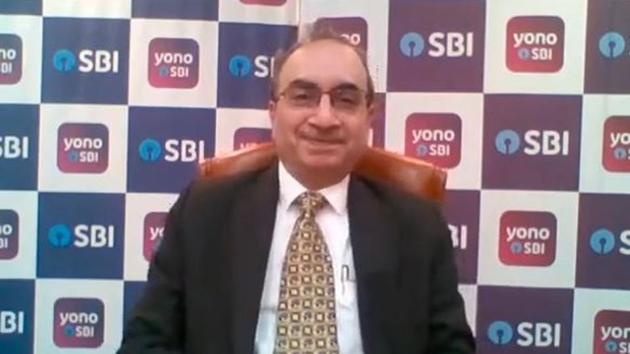HTLS 2020: Unlock process has led to demand revival, says SBI chief
Dinesh Kumar Khara, who took the helm of India’s largest bank last month, also allayed apprehensions that permitting large corporate houses to own banks would lead to problems.
ndia’s gross domestic product (GDP) is expected to shrink between 8% and 9% in the fiscal year ending in March, less than the 9.5% contraction forecast by the Reserve Bank of India (RBI), because of an improvement in business activity after the easing of the post-Covid-19 lockdown, State Bank of India (SBI) chairman Dinesh Kumar Khara said on Thursday.

Khara, who took the helm of India’s largest bank last month, also allayed apprehensions that permitting large corporate houses to own banks would lead to problems. He was reacting to recent recommendations of a panel of the RBI that proposed to allow large industry houses into banking, which attracted sharp criticism from the central bank’s former governor Raghuram Rajan and deputy governor Viral Acharya.
At the 18th Hindustan Times Leadership Summit, Khara expressed confidence in economic revival after the lifting of the Covid-19-induced lockdown in the second quarter of the current financial year.
“We have seen demand revival with unlocking of the economy... This is the reason all of us are expecting lower contraction at the end of the second quarter... and hopefully it will sustain also. And perhaps [the] year-end would look much better than what was envisaged,” he said a day before the government releases official data on India’s gross domestic product (GDP) in the quarter ended September.
India’s GDP contracted by a record 23.9% in the first quarter of the current financial year mainly because of a 68-day hard lockdown enforced on March 25 that closed factories manufacturing products deemed non-essential, business establishments and service providers, shut down public transport and confined residents indoors. The economy has since gradually opened up.
Also Read | HTLS 2020: ‘Won’t allow unilateral action by PLA at LAC’, says Rajnath Singh
RBI governor Shaktikanta Das on October 9 estimated that the Indian economy could contract 9.5% in fiscal 2021 because of disruptions caused by the pandemic, but growth could resume in the fourth quarter as signs of an economic recovery were visible.
Khara said the banking sector has undergone a significant change with robust systems in place and it is “agnostic to the ownership” as much depends on corporate governance. “So, I think, whether public or private, whatever may be the ownership structure, the most important in the banking system is the corporate governance, and also the related-party transactions, and exposure limits.”
“So, essentially, I think so long as these things are enforced, either through regulations or through oversight mechanism, the banking system should not have much of an issue. I think what they are apprehending, perhaps, if at all, there would be some kind of slackness in regulation or oversight there could be perils for the system as a whole,” he added. He, however, said that over a period of time, the regulations have become quite strict and adequate oversight mechanisms are in place. “I think, so long as corporate governance is tight and regulations are strict, ownership structure does not really matter much,” he added.
According to the SBI chairman, small and medium enterprises (SMEs) are the next growth story post-pandemic, which has presented both risks and opportunities. Banks have to be alert on their asset quality, Khara said while pointing to the risk factor.
On opportunities, he said: “SMEs are going to be the new opportunity and lever for growth.” The micro, small and medium enterprises (MSMEs) have received a major boost from the government’s credit guarantee scheme and policies favouring their growth, he said. “We are aspiring for growing our SME book,” he said.
The ₹3 lakh crore Emergency Credit Line Guarantee Scheme (ECLGS) is one of the key components of the ₹20 lakh crore economic stimulus package under the Atmanirbhar Bharat Abhiyan launched in mid-May, which offers additional working capital finance in the form of a term loan to MSMEs and professionals






